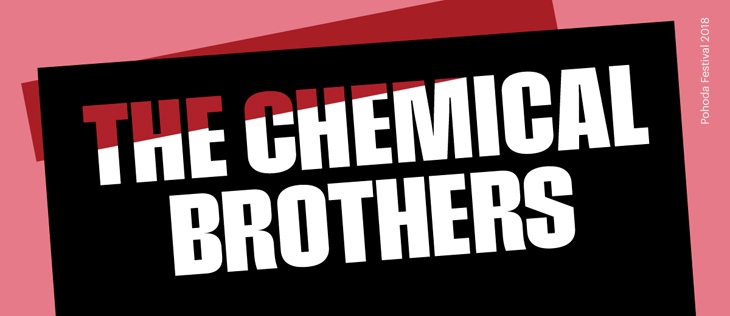
“What if dance music hit as hard as the fiercest hip-hop and rocked with the visceral force of your favorite guitar banger?” This is what the journalists of Rolling Stone believed was the original conceit of The Chemical Brothers that had shaped their goal. Then Tom Rowlands and Ed Simons entered the studio and recorded the album Dig Your Own Hole that influenced the history of electronic music. “The Chemicals” have so far won Grammy Awards, BRIT Awards, and MTV Europe Music Awards; they have released six No. 1 albums, and journalists regularly include their recordings in the charts of the best of the dance music ever. We are well aware of the fact that the preferences of music editors are subjective—this is why we are very excited that you too will be able to make your own opinion of the legend of electronic music at Pohoda 2018.
“Galvanize”, “Hey Boy, Hey Girl”, “Do It Again”, “Believe”, “Wide Open”, “Out of Control”, “Let Forever Be”, “Go”, “Block Rockin’ Beats”, “Setting Sun”, “It Began in Africa”… this is just a short list of hits that have dominated the sales and popularity charts and dance floors in clubs and at festivals around the world over the past two decades. All these songs, however, were not created under the famous brand of The Chemical Brothers. Tom Rowlands and Ed Simons first performed under the aliases “The 237 Turbo Nutters” and “The Dust Brothers”. After the first EPs, in 1994 they recorded successful remixes of Manic Street Preachers, The Charlatans, Primal Scream, and The Prodigy, which also appeared on MTV Europe. At the beginning of 1995, they had their first tour in the US along with the bands Orbital and Underworld. Their debut album Exit Planet Dust was a significant shift in their career and it inspired their name change: they started performing as The Chemical Brothers. The album instantly ranked among the top ten in the UK and it anticipated another bandʼs specific feature—collaboration with other famous artists. The album featured, for example, songwriter Beth Orton and Tim Burgess of The Charlatans.
Another example of successful collaboration is their first No. 1 single “Setting Sun” that featured vocals from Noel Gallagher. Pitchfork included the song among the most influential tracks of the 1990s and The Guardian described it as the most experimental and the most sound-extreme hit of the last decade of the last century. The next single “Block Rockinʼ Beats” became a No. 1 too and it also brought them their first Grammy Award (Best Rock Instrumental Performance). Both the songs appeared on their breakthrough album Dig Your Own Hole. Mixmag and AllMusic were generous with stars and gave the album the highest possible rating. With the distance of time, virtually everyone agreed with the reviews. The album was included in the selection of the best albums of all the times also by the Q Magazine and NME, and Rolling Stone even called it the second most important album in the history of electronic dance music.
In May 1999, they recorded another superhit “Hey Boy, Hey Girl”, which suggested the house orientation of the third album, Surrender, that also hit sales charts in the UK. The song “Let Forever Be” again featured Noel Gallagher, as well as the Oscar-winning director Michel Gondry. Pitchfork ranked the video for the song as the seventh best clip of the 90ʼs. Another example of successful collaboration is the song “Out of Control” that featured Bernard Sumner of New Order. The next album Come with Us containing the hit “It Began in Africa” became another number one in sales in the British Islands. It again featured Beth Orton and director Gondry, as well as Richard Ashcroft of The Verve. At that time, they were already headliners of festivals such as Glastonbury, Creamfields, and Coachella; their songs were the anthems of the biggest parties in Ibiza and they appeared in well-known computer games and films (Butterfly Effect).
In 2005, they released the album Push the Button, which included hits such as “Believe” and “Galvanize”. The latter one featured Q-Tip of A Tribe Called Quest. Both the song and the album won the Grammy Award. “Believe”, on the other hand, won the MTV Europe Music Awards for the video of the year. Another No. 1 and Grammy Award winning album followed, We Are the Night, with hits “Do It Again” and “The Salmon Dance”. In 2010, they released their seventh album Further and collaborated with Clint Mansell on the soundtrack for the film Black Swan. Pitchfork called Further their best record for the last decade. In July 2015, they released the album Born in the Echoes, which became their sixth No. 1 in sales in the UK. And again, it was not lacking collaborations with stars. The song “Go” featured Q-Tip, “Wide Open” had vocals of Beck, and the voice in “Under Neon Lights” belongs to another star of Pohoda 2018, St. Vincent. The futuristic clip to “Wide Open” was a result of one more cooperation with dom&nic, who had also done the award-winning video for the song “Believe”. The clip featured the actress Sonoya Mizuno known from the dystopian sci-fi Ex Machina. According to The Observer, the album brings an excellent combination of the well-known and the visionary, a repetitive formula that each time brings the work of the duo above expectations. The Quietus concludes that the album is yet another example of Rowlands and Simonsʼ miraculous ability to teach the instruments to sing. We are very excited that their “magic machines” and the detailed LIVE show will launch the 22nd year of the Pohoda festival. Eventinfo HERE!
Confirmed artists:
X